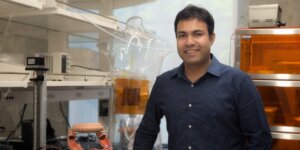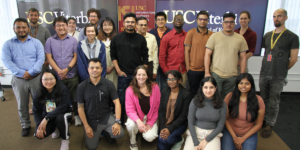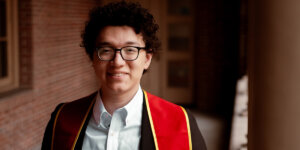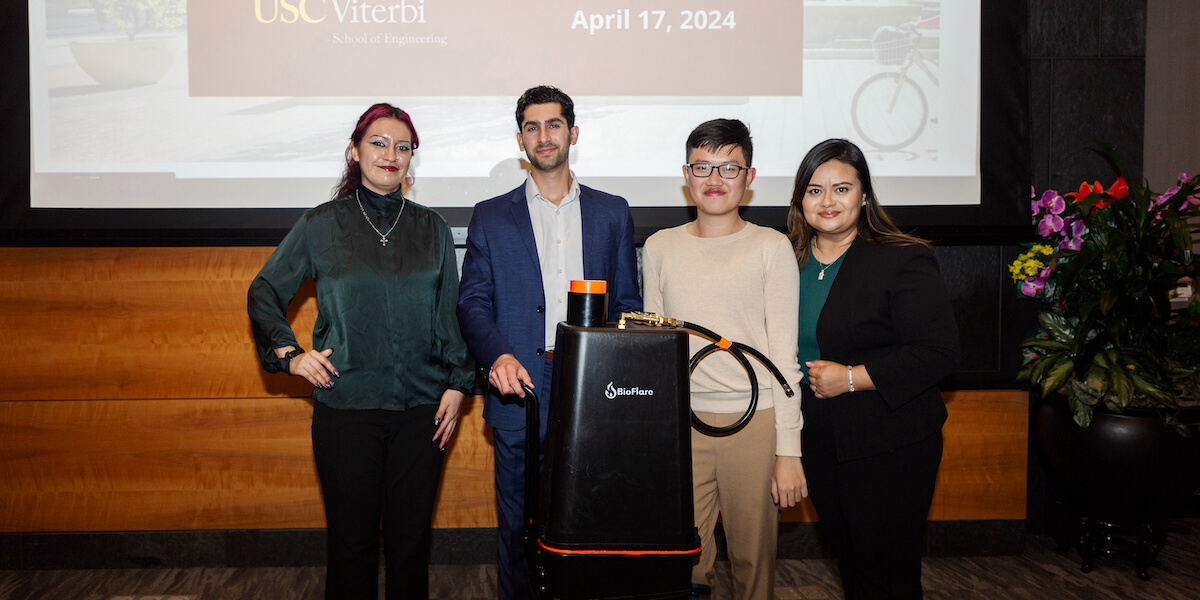
Min Family Challenge winners BioFlare (Photo/Angel Itua)
For about one-third of the world’s population, cooking can literally be a health hazard. Lacking access to gas-lines, they must rely on expensive and environmentally damaging firewood, charcoal or propane tanks to cook their meals, exposing them to harmful indoor pollutants.
BioFlare, a startup founded by four USC students, including one from the Viterbi School, believes there is a better way. Members of the burgeoning company are developing a kitchen device that would transform most organic food waste into gas for cooking. Consumers would toss fruits, vegetables and other food scraps into a rectangular-shaped unit, add a proprietary bio-mix, and wait for the waste to transform into biogas. BioFlare’s system would then filter the gas for purification, while a gas hook-up would transport the sustainable cooking fuel to a stove or burner.
That vision landed BioFlare the $50,000 grand prize at the 2024 Min Family Challenge, an engineering startup competition that encourages would-be social entrepreneurs to build companies to benefit the underprivileged locally, nationally, and even worldwide with sustainable solutions. Educational sessions, workshops, and meetings were held virtually throughout the academic year with the finals held on Wednesday, April 17.
“Winning The Min Family Challenge marks a pivotal milestone for our team,” said Jacqueline Franco, a master’s student in integrated design, business, and technology at the Iovine and Young Academy. “These funds will breathe life into our vision, enabling us to finalize our prototype and manufacture a model that we can deploy and test with users.”
Added BioFlare’s Nam Nguyen, a senior majoring in political science and minoring in computer programming and management consulting: “Winning really furthers my motivations for just social impact and creating a more equitable world.”
USC Viterbi Dean Yannis Yortsos said the challenge contributes to a better world. “The MFC is testament to combining technological ingenuity with significant societal impact for the benefit of society.”
Trina Gregory, MFC co-director and associate director of the Office of Technology Innovation and Entrepreneurship, or TIE, said the challenge’s curricula and instruction have improved over the years, partly in response to student feedback. This year, for instance, professors stressed the importance of quickly identifying and fleshing out an idea and “focusing on who you’re impacting and what your mission is,” she said. “We really help them identify their goals.”
“It’s about helping the underprivileged”
MFC launched in October 2015 with a generous gift from Bryan Min, B.S. ISE ’86 and a member of the USC Viterbi Board of Councilors, and his family: his wife Julie Min; their son Brandon, a USC Viterbi graduate in industrial systems engineering; and daughter Brittany, also a USC graduate.
Said Bryan Min: “Each year we are so impressed at the innovations that the students come up with to start up a business for the sake of doing good.”
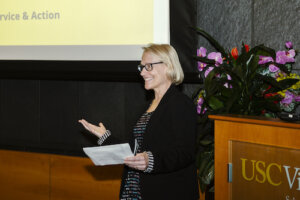
Trina Gregory, MFC co-director and associate director of the Office of Technology Innovation and Entrepreneurship (Photo/Angel Itua)
At the MFC finals, Julie Min said her family has long been involved in philanthropy, fueled by their Christian faith and commitment to helping those in need. Addressing MFC students, she said: “I appreciate you guys so much because you’re helping us with our dream of helping the marginalized…You guys are just like rock stars to us, and we thank you.”
This year, 35 teams applied for the MFC. Fifteen teams were selected to participate, while five advanced to the finals. David Gerber, MFC co-director and TIE associate director, said the challenge provides participants with invaluable exposure to high-tech entrepreneurship.
“We’re providing them with an opportunity they never would have had,” he said. “We’re teaching them how develop an idea in the context of a specific market, work as a team, become more confident, and really, to start a company.”
The other 2024 MFC finalists included:
Air-quifer: Air-quifer provides a portable fog collection system that resolves water scarcity by delivering fresh water through a mesh and gravity-fed filtration system, supported by a mobile app for monitoring yield and optimizing placement.
Hopeful Havens: Reimagining how young people play in public spaces, Hopeful Havens’ Alba will facilitate healthy and educational play for our users through games and social-emotional learning activities.
PipWell: Creating smarter healthcare forms to accelerate the patient communication process, PipWell helps healthcare professionals and patients reach more accurate and informed diagnosis, leading to better outcomes.
SoFiiT, Inc.: SoFiiT is a digital fitness and wellness platform designed to help students find compatible workout partners to achieve their fitness goals, participate in group fitness activities, cultivate healthy lifestyles, and forge meaningful relationships through fitness.
As in the past, this year’s MFC theme was inspired by the Grand Challenges of the National Academy of Engineering and by the 2030 Agenda for Sustainable Development, a universal call to action to end poverty, protect the planet and improve the lives of people everywhere.
Participants in this year’s challenge attended workshops that focused on customer discovery, storytelling, product design, and measuring impact. The challenge also distributed $250 to each team for customer discovery and prototyping. Each MFC team was also eligible for up to $5,000 in Amazon Web Services cloud credits over two years and $1,500 in free AWS business support for one year.
Mika Jain, a master’s student at the USC Marshall School of Business in social entrepreneurship, said she and her teammates on Hopeful Havens learned important business lessons from participating in MFC.
“My favorite workshop was the pitch deck workshop, where the MFC team taught us about the concept of ‘sneaky slides,’ or slides that you have on-deck at the end of a presentation to reference when panelists ask you questions,” Jain said. “These workshops have helped us prepare for any question a panelist or judge might ask, and we are grateful for the regular cadence of lectures and workshops that guided us to the finals.”
BioFlare’s Franco said the workshops and lectures helped her and her teammates “understand and value the undeniable role of prioritizing customer-centricity throughout every stage of the entrepreneurial journey. The customer relationship is a never-ending relationship that must be consistently and continuously nurtured.”
MFC participants also benefited from working with volunteer mentors, who helped them hone their ideas and develop strong business strategies.
Scott Easley, a 20-year veteran of the video game business and senior lecturer for the Computer Science Games program at the Viterbi School, worked with finalist Hopeful Havens and Green Circle, another MFC team. “My job was to encourage and advise and to help them realize the best possible approach,” he said.
Sandra Ell, Caltech’s emeritus chief investment officer, has served as a mentor for five years, including for BioFlare. She said she tries to help teams consider their options before choosing those most likely to succeed. “My role has always been to ask key questions that will guide them to creating a company that realistically delivers a product that is needed and for which there is a proven market.”
MFC constantly evolving
MFC has consistently evolved over the years.
During the 2017 – 2018 academic year, MFC took USC Viterbi and other students to Texas to meet with Hurricane Harvey survivors. Participants focused on developing sustainable ventures to enhance relief and recovery efforts for victims of that and other natural disasters.
In 2019, the challenge focused on the world’s growing refugee crisis. As part of a special class, CE 499: Engineering Innovation for Global Challenges, students went to Lesvos, Greece, to meet with refugees and devise innovative solutions to meet the needs of people in crisis.
The 2021 winner, Social Benefit, aims to help end cyclical homelessness and poverty by creating a digital platform that brings transparency to government benefits for low-income populations and their case managers. The 2022 victor, Remedy, has developed a flexible container and wearable pouch that allow unhoused people to protect their medication from would-be thieves. SIER Technologies, last year’s MFC winner, is developing specially outfitted glasses with built-in speakers that will issue warnings to the visually impaired as they near unseen objects.
“We’re teaching students how to change the world through viable, scalable technological solutions,” said Gerber, the challenge co-director.” “MFC is about social and global impact.”
Published on April 25th, 2024
Last updated on April 25th, 2024




